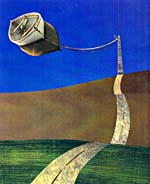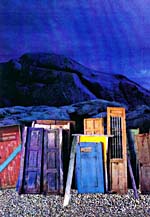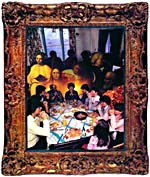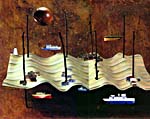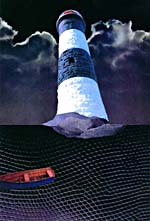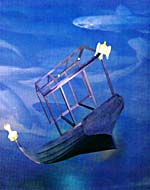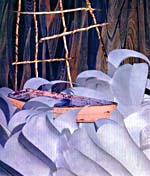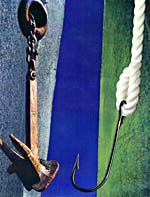Common menu bar links
Institutional links

ARCHIVED - The Glenn Gould Archive
Archived Content
This archived Web page remains online for reference, research or recordkeeping purposes. This page will not be altered or updated. Web pages that are archived on the Internet are not subject to the Government of Canada Web Standards. As per the Communications Policy of the Government of Canada, you can request alternate formats of this page on the Contact Us page.
Art and Poetry
The Inner Eye
The Latecomers
1. "The traditional phrase was that Newfoundland is at the end of the line, it's an island at the end of the line..."
Listen to the excerpt [RM 36 KB]
2. "There's the outside world and there's a barrier – the barrier may be lack of road or maybe eight or ten miles of stormy water, whatever, it is a barrier creating the state of isolation. On the other side of that barrier there is the rest of the world.. Now, everything in the outside world that's trying to get in, if it were all good, all desirable, of course isolation would be a terrible thing..."
Listen to the excerpt [RM 134 KB]
3. "[Faulkner's] novels are universal in that they deal with the universal problems of the human soul or, as he preferred to call it, the human spirit. But if you can interpret these problems in terms of a strong local region, you can do it much more surely and much more convincingly. Well, let me put it this way; perhaps "The Last Supper" is as great an abstract work of art as anything produced."
Listen to the excerpt [RM 162 KB]
4. "In a certain sense, of course, Newfoundland itself is a fantasy..." (Glenn Gould, from programme notes for The Latecomers.)
5. "I could tell you some very interesting stories about some of these people. I knew two brothers who lived there in that area, one on one side of the point, the other on the other, about 100 yards apart, and I don't suppose one of them visited the other in twenty years, just stayed apart, no animosity mind you, no animosity, friendly, and they didn't ask for help from the other one. Both of them had large boats, 30 - 40 ft, boats; they would get these out of the water in the Fall, repair them themselves, requiring help but yet they would do it themselves, they were that type. And you know the interesting thing about it, the follow up? I buried the both of them the same day, one on one side of the point, the other on the other. The ashes of one on one side of the point and the body of the other on the other side.."
Listen to the excerpt [RM 259 KB]
6. "You will find, for example, if you travel around the coast of Newfoundland, probably ten or a dozen basic types of boats which are suited to particular localities. Now these were developed indigenously and they are a form of art, not in the fine art sense, but in one sense they are. And they involve a certain amount of ingenuity, a certain amount of imagination, a certain amount of creativeness and this is the sort of thing I think that the mental energies as well as the physical energies of most Newfoundlanders went into."
Listen to the excerpt [RM 205 KB]
7. "I suppose I see it through slightly rose-tinted glasses now and I see it in a sense as a romantic sees it and as a sentimentalist sees it ... [but] you can't seal these places off and make museums out of them. The impact of modern technology is bound to be felt."
Listen to the excerpt [RM 110 KB]
8. "They came in and, of course, we had a feeling that whatever was done by the outsiders – we always called them outsiders – whatever was done by the outsider was right. Now, no reflection on civilization as it is, but I think we had a real civilization before they came. That is how I feel about it ..."
Listen to the excerpt [RM 86 KB]

